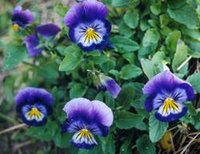Violet (plant)
|
|
| Violets | ||||||||||||
|---|---|---|---|---|---|---|---|---|---|---|---|---|
 5-petaled purple, white, and yellow pansies | ||||||||||||
| Scientific classification | ||||||||||||
| ||||||||||||
| Species | ||||||||||||
|
Viola bicolor Pursh |
Violets (genus Viola) are flowers of the family Violaceae, with around 400 species throughout temperate areas of the world. Most violets are herbs found in moist and slightly shaded conditions such as hedgerows.
Violets are small perennial plants often with large heart-shaped leaves, which flower profusely in spring. The genus includes the Sweet Violet (Viola odorata, the common violet of the English countryside) and Dog Violet, and many other species whose common name includes the word "violet". However it also includes the garden pansies, their wild progenitor the heartsease Viola tricolor (a European plant introduced into North America, where it has acquired the name Johnny jump up because of the speed at which the flower grows.), and a number of similar plants native to North America, such as the Yellow Pansy of the Pacific coasts.
The young leaves are edible raw or cooked as a somewhat bland leaf vegetable. They are rich in vitamins A and C. The flowers can be used to decorate meals. Flowers, leaves and roots are used for medical purposes. The plants are used as food plants by the larvae of some Lepidoptera species including Lesser Broad-bordered Yellow Underwing.
Violet_toporas.jpg
One quirk of the violet is its elusive scent - a major component of the scent is a ketone compound called ionone, which temporarily desensitises the receptors in the nose; sniff all you like, you won't get any more smell from the flower!
In North America, there are several different species of wild violets. Some are blue, some are yellow, white, or cream; some are even bicolored. In addition, the shape of the petals defines more species; for example, some violets have a "spur" on the end of each petal. The Common Blue Violet, Viola sororia, is the state flower of Rhode Island, Illinois, and New Jersey.
Australia is home to a number of violets, including Viola hederacea and Viola banksii, first collected by Joseph Banks and Daniel Solander on the Cook voyage to Botany Bay.
African violets are not related to the true violets.
Reference
- ITIS (http://www.itis.usda.gov/servlet/SingleRpt/SingleRpt?search_topic=TSN&search_value=22030) 2002-12-02
